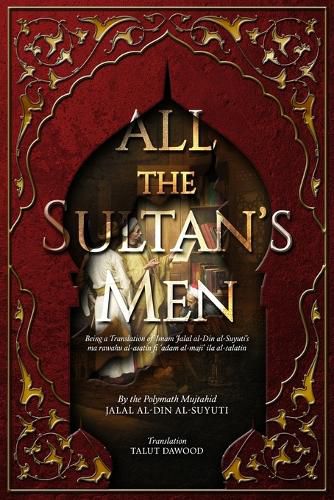Readings Newsletter
Become a Readings Member to make your shopping experience even easier.
Sign in or sign up for free!
You’re not far away from qualifying for FREE standard shipping within Australia
You’ve qualified for FREE standard shipping within Australia
The cart is loading…






This title is printed to order. This book may have been self-published. If so, we cannot guarantee the quality of the content. In the main most books will have gone through the editing process however some may not. We therefore suggest that you be aware of this before ordering this book. If in doubt check either the author or publisher’s details as we are unable to accept any returns unless they are faulty. Please contact us if you have any questions.
All the Sultan’s Men is a translation of Imam al-Suyuti’s text Ma Rawahu al-Asatin fi ‘Adami al-Maji'i ila al-Salatin . As indicated by the title, it argues and establishes the blameworthy nature of scholars associating with rulers.
Since the age of early Muslims when the Prophetic Khilafah ended and the era of Muslim kings and empires began, scholars have wrestled with the nature of the relationship between the ulema-class and rulers. Some of our most illustrious Imams, such as Imam Abu Hanifah & Imam Malik, refused official appointments from rulers. Moreover, they refused to visit them in their courts. Others such as Qadi Abu Yusuf - the student of Imam Abu Hanifah - accepted official appointments. Such disparity in the way of dealing with the rulers was echoed throughout the time of the Tabi'in. Some scholars accepted appointments, while others criticized them and refused such an association.
Nonetheless, both scholar and layman require guidance on the correct measures to take in times of confusion. One may wonder, When is it acceptable for a scholar to accept an appointment? Or When is it appropriate for a scholar to avoid politics altogether? Others may ask, Is there a middle ground between the two opinions? Such questions require in-depth answers. Although this text is only an introduction to the subject, it provides clear guidance on what kinds of interactions with the rulers are blameworthy for scholars, and why.
$9.00 standard shipping within Australia
FREE standard shipping within Australia for orders over $100.00
Express & International shipping calculated at checkout
This title is printed to order. This book may have been self-published. If so, we cannot guarantee the quality of the content. In the main most books will have gone through the editing process however some may not. We therefore suggest that you be aware of this before ordering this book. If in doubt check either the author or publisher’s details as we are unable to accept any returns unless they are faulty. Please contact us if you have any questions.
All the Sultan’s Men is a translation of Imam al-Suyuti’s text Ma Rawahu al-Asatin fi ‘Adami al-Maji'i ila al-Salatin . As indicated by the title, it argues and establishes the blameworthy nature of scholars associating with rulers.
Since the age of early Muslims when the Prophetic Khilafah ended and the era of Muslim kings and empires began, scholars have wrestled with the nature of the relationship between the ulema-class and rulers. Some of our most illustrious Imams, such as Imam Abu Hanifah & Imam Malik, refused official appointments from rulers. Moreover, they refused to visit them in their courts. Others such as Qadi Abu Yusuf - the student of Imam Abu Hanifah - accepted official appointments. Such disparity in the way of dealing with the rulers was echoed throughout the time of the Tabi'in. Some scholars accepted appointments, while others criticized them and refused such an association.
Nonetheless, both scholar and layman require guidance on the correct measures to take in times of confusion. One may wonder, When is it acceptable for a scholar to accept an appointment? Or When is it appropriate for a scholar to avoid politics altogether? Others may ask, Is there a middle ground between the two opinions? Such questions require in-depth answers. Although this text is only an introduction to the subject, it provides clear guidance on what kinds of interactions with the rulers are blameworthy for scholars, and why.